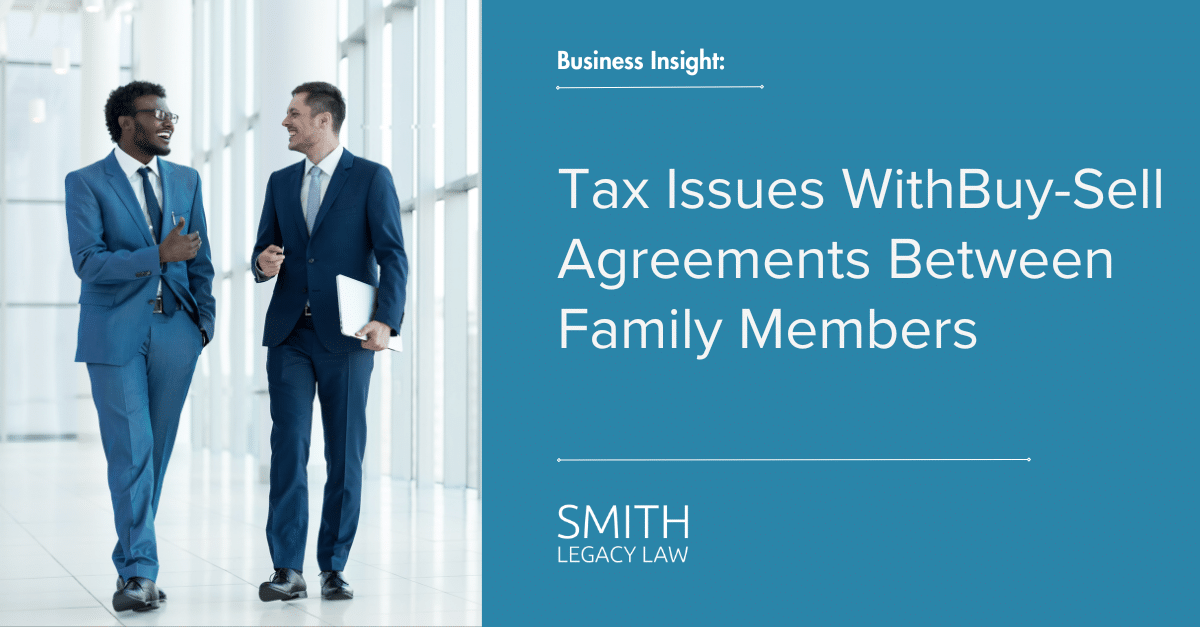Buy-sell agreements offer business owners an important tool for succession planning. If there are multiple owners or partners and one of them departs voluntarily or involuntarily, problems can arise if there has been no planning to address what happens to the interest of the departing owner. Partnerships and closely held businesses can use buy-sell agreements to provide a clear mechanism for “cashing out” a person’s interest, usually at death but can also operate at retirement or another exit point. To avoid conflicts and adverse financial consequences, it is critical to get advice on how best to structure the agreement because there are numerous issues to consider. One such issue involves the impact of tax laws on buy-sell agreements between family members.
Structuring the Buy-Sell Agreement
The goal of the buy-sell agreement is to provide an option, usually exercisable against the estate of the owner or partner, to purchase the deceased’s interest in the business. The agreement can be structured as a stock purchase/redemption or a Family Limited Partnership agreement in some instances.
Buy-sell agreements are sometimes funded with life insurance policies. In this case, the co-owners purchase life insurance on each other. When one dies, the insurance proceeds are used to pay heirs for the decedent’s share of the business, allowing the survivor to retain the entirety of the business.
An important part of these agreements is how the deceased’s interest will be valued. The parties are usually concerned with everyone getting what they are owed, but there are additional considerations to keep in mind with respect to valuation of the business interest for estate tax purposes, particularly in family businesses.
Tax Issues
Internal Revenue Code (IRC) Section 2703 sets forth special valuation rules for buy-sell agreements. It states that when valuing an asset that is subject to such an agreement, the agreement will be disregarded, meaning that the appraiser/tax assessor will not consider the terms of the agreement in determining the value of the interest. The intent of this provision is to prevent individuals from using a buy-sell or other such agreement to create an artificially depressed value of an asset.
There is an exception to IRC 2703 for an agreement that meets the following requirements:
- It is a bona fide business arrangement;
- The agreement is not a device to transfer property between family members for less than full and adequate consideration; and
- The terms of the agreement are comparable to a similar arm’s length transaction.
If all these elements are met, the provisions of IRC 2703 will not apply.
Connelly Case
A recent decision by the U.S. Court of Appeals for the 8th Circuit addressed the application of the exception in IRC 2703. The decision is significant because it contradicts a ruling on a similar issue in another Circuit Court, creating uncertainty as to how these agreements will be scrutinized.
The case of Connelly v. United States case involved two brothers who had a stock redemption agreement that was funded by a life insurance policy on each of the brother’s lives. The agreement provided a method for valuing the company at death and required that during their lifetime the brothers annually agree on the value of the company.
However, the Connelly brothers disregarded the valuation provisions during their lifetime. Upon the passing of the first brother, the valuation method agreed upon in the stock redemption was also disregarded. Instead, the estate and company settled on an agreed-upon value and the funds from the life insurance policy were used to pay the estate.
The IRS challenged this valuation and further claimed that pursuant to IRC 2703, the value of the company must include the proceeds received from the life insurance policy. The rationale for this position was that the exception to IRC 2703 did not apply and that the proceeds were an asset of the company which any buyer would consider in valuing the business.
The Tax Court sided with the IRS finding that the exception did not apply. The stock purchase agreement did not set a fixed and determinable price and even the parties to the agreement ignored the terms of the agreement in determining the value.
The case was appealed and the 8th Circuit similarly agreed with the IRS and Tax Court. The lack of a fixed determinable price was fatal to the analysis of the exception factors. Further, the Court concluded that the value of the company must include the entire proceeds of the life insurance policy, thus doubling the value of the deceased brother’s interest.
The problem is that the Connelly case represents a complete departure from the other leading case on this issue, Estate of Blount, in the 11th Circuit. Blount also involved an agreement that didn’t meet the exception in IRC 2703. However, the Court held that the valuation of the company did not include the proceeds from the life insurance because the proceeds were offset by the “liability” of the required buyout of the deceased owner’s share. Thus, there now exists a split of opinions about how this issue will be handled by courts.
Takeaways
In the wake of Connelly, the need for an agreement that will meet the exception to the IRC 2703 rule is more important than ever. If you have or are considering a buy-sell agreement, consult an attorney and make sure to adhere to any valuation terms set forth in the agreement. Additionally, consider whether the life insurance policies should be owned by the individuals rather than the company to avoid tax pitfalls.
Our attorneys can help you develop a comprehensive estate plan, including a business succession plan and buy-sell agreement to meet your needs. Contact us to discuss your options.
